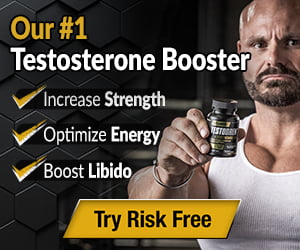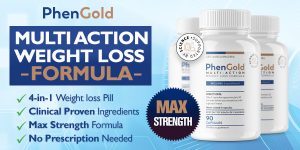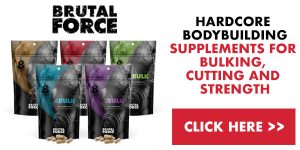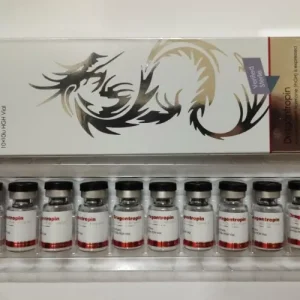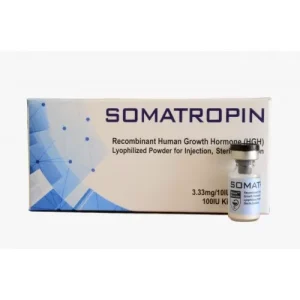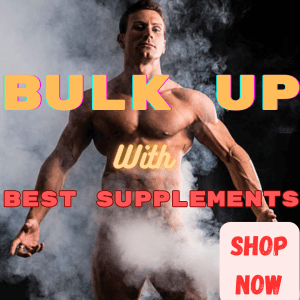Supplements
Urinary Incontinence and Bladder Health in Women over 40 Years old

Introduction
Urinary incontinence and bladder health are two related health issues that have become of significant concern recently. They are directly related in the sense that problems in bladder health will, in most cases, culminate in urinary incontinence. These problems have been found to occur more commonly in women than men, usually attributed to pregnancy and menopause. Urinary incontinence in women can be seen as the loss of urine without the urge to urinate.
To help reduce these cases in women, mainly if they occur due to problems in bladder health, you can use a bladder health supplement. This article highlights the issue of urinary incontinence in women and how well you can ensure that your bladder is healthy.
Causes of Urinary Incontinence in Women
Several things come in as causes of urinary incontinence. It should be clear that the occurrence of urinary incontinence does not necessarily mean that it is a disease but is a symptom. The reasons can be classified as follows:
- Temporary causes
Temporary causes usually cause short-term urinary incontinence because they contain or are themselves diuretics. Some are the common foods we eat, and some are the medication we take. Diuretics act on the bladder and the rest of your urinary system to increase the volume of urine produced. The stimulated bladder and increased urine volume lead to urinary incontinence that usually goes away if the substance is eliminated from the body.
Related article: The Use Of Diuretics In Bodybuilding
These causes may include the following:
- Alcohol and carbonated drinks such as coca cola
- Artificial sweeteners and chocolates
- Medications used in the treatment of heart problems and hypertension
- Vitamin C, when taken in large doses
Medical conditions and Disease processes
Some medical conditions and disease processes also cause urinary incontinence. These are conditions and diseases that affect bladder health and influence its physiology. In most cases, they are treatable and can be categorized as transient causes of urinary incontinence. Common conditions and diseases process that is implicated in urinary incontinence include:
- Infections of the urinary tract(UTIs)
- Constipation
Persistent causes
Persistent causes are the underlying physiological and pathological conditions that constantly affect the bladder leading to incontinence. These include:
- Pregnancy with pregnancy comes changes in hormones, which may have a direct or indirect effect on the bladder. The fetus also exerts some pressure on the bladder leading to incontinence.
- As you age, tissues in your body also get older, including those of the bladder. Therefore, the bladder has little capacity to manage urine as you age, and you may start experiencing urinary incontinence for the first time.
- Vaginal delivery women who bear many children would most likely have urinary incontinence. This is because, with every birth, there is a weakening of those muscles which help the bladder have control over urine. This means that you are more likely to have urinary incontinence.
- Menopause, just like, pregnancy, comes with changes in hormones. The hormone estrogen, which has a role in maintaining the health of the mucosa lining the bladder and urethra, is, reduced, which may trigger urinary incontinence. This is one explanation why urinary incontinence in women over 40 is of significant concern and should be highlighted well.
- Hysterectomy refers to the surgical removal of the uterus mainly due to malignant issues. It is an important cause of urinary incontinence because it is usually in close contact with the bladder and is supported by the same muscle. If such powers are destroyed during the process, it will lead to urinary incontinence.
- Disorders in the nervous system smooth muscles of the bladder are under nervous control, and any neurological condition involving nervous supply to the bladder will lead to urinary incontinence.
Must read: 5 Supplements to avoid during pregnancy
Different types of urinary incontinence
Stress Incontinence
Stress incontinence occurs when any situation that puts pressure on the bladder causes urine leakage. Such conditions, such as sneezing, will not cause urine to leak, hence a reason to speculate stress incontinence. This type of stress incontinence is prevalent in women since their bladder is more likely to be stressed by physiological conditions such as pregnancy and vaginal delivery. Stress incontinence, in many cases, is treatable either by bladder supplements or other medical interventions.
Urge incontinence
It occurs when urine leaks immediately after feeling the urge to urinate without your control. Urge incontinence, in most cases, is a neurological problem with the bladder having inappropriate spasms. People with urge incontinence often empty their bladder even after drinking a small amount of fluid and may wake up open on their beds. Being a neurological problem, emotions such as anxiety can worsen the situation, and even drugs such as diuretics. People with Alzheimer’s and diabetes are likely to experience this type of incontinence.
Overactive bladder
Like urge incontinence, incontinence due to an overactive bladder has its route in neurological problems. The difference is in the time. In this type of incontinence, there are nerve signals at a time when you are not expecting to urinate. It is also common among women and may present with:
- High frequency of urination
- Nocturia, where one wakes up at night to urinate
- The urgency of urination is high
Functional incontinence
Functional incontinence may not be of great medical importance, but it occurs sometimes. It is particularly prominent in people who cannot plan correctly about when to urinate and therefore end up leaking urine uncontrollably. They are primarily people with specific disabilities and medical conditions that affect their judgment.
Overflow incontinence
Overflow is a type of incontinence resulting from weak bladder smooth muscles. The bladder generally fails to empty correctly, leading to a spillover.
Treatment of Urinary Incontinence
Urinary incontinence can be an embarrassing condition, so the need to be treated as early as possible. Treatment of urinary incontinence focuses significantly on the bladder, and many ways can be used. After determining the type of incontinence, your doctor may suggest several methods for your treatment.
Control 24 ➢ Buy it HERE.
Different treatment approaches for urinary incontinence include:
- Behavioral and training means
Timed voiding and Kegel exercise are two popular means commonly used for treating urinary incontinence. Timed voiding involves utilizing the bathroom at specific times, while kegel exercise is meant to strengthen the muscles responsible for holding your urine.
- Medications
Certain medications are essential when it comes to certain types of incontinence. For instance, when it comes to an overactive bladder, anticholinergic drugs can effectively reduce the spasms and help mitigate this type of incontinence. The only problem is that they come with certain side effects, for example, a dry mouth and even blurred vision, when used in large doses.
- Neuromodulation therapy
Neuromodulation therapy is another way to treat urinary incontinence, particularly urge incontinence. InterStim is a device used in this therapy and mainly involves stimulating nerves that go to the bladder from the spinal cord. Neuromodulation is only meant for certain people and is not suitable for everyone.
Bladder health and incontinence
A healthy bladder ensures that you avoid problems that come along with urinary incontinence. There are several ways to prevent incontinence and regain your normal bladder function. Using bladder control supplements is one such way, among others. We focus on some of these bladder health supplements and how they contribute to helping you avoid urinary incontinence.
Top 5 bladder health supplements for use
Most joint bladder supplements are herbs. They include:
1 Vitamin D
Vitamin D has been approved as one of the most effective bladder supplements that you can use.
Features
- Has effects on muscles of the pelvic floor
- Also has effects on bones
Pros
- Works well both in men and women
- The bladder is made of strong
Cons
- It may have some side effects on bone health
Why you should buy vitamin D supplement
The good thing about buying a vitamin D supplement is that it offers double benefits, helping you for a healthy bladder and bones.
2 D-Mannose
D-Mannose is a carbohydrate, just like glucose. It has some beneficial roles as a bladder health supplement.
D-Mannose ➢ Buy it HERE
Features
- It is a carbohydrate
- Its effect is on the normal flora of tracts such as the Genital Urinary Tract (GUT).
Pros
- Efficiently improves genital and urinary tract health.
- Maintains the normal beneficial flora of the GUT
Cons
- Probable side effects
Why you should buy this supplement
D-mannose occurs naturally and is also abundant even in some body cells. Its role in supporting the bladder is prominent, and it can go a long way toward preventing the occurrence of urinary incontinence.
3 Probiotics
Probiotics are simply types of bacteria that are beneficial and are found in the lumen of the GIT or GUT. A good example is lactobacillus bacteria, which has a good effect on the GUT, ensuring that your bladder and other related organs are healthy.
Probiotics Imunne ➢ Buy it HERE
Features
- Are bacteria that are part of the normal flora of the body
- Come in many different strains
Pros
- Good for balancing the normal flora
- Great for supporting the bladder and the rest of the urinary system
- Is beneficial to the digestive tract
- Also suitable for the immune system
Cons
- Some bacteria may be harmful, causing diseases
Why you should buy Probiotics
Buying probiotics ensure that you not only improve your bladder's health but also improve your immune system, ensuring that you are not exposed to bladder infections that can lead to incontinence.
4 Go-Less Bladder Control Formula
This is a good bladder control supplement that you can use to help you have reasonable control of your urinary incontinence.
AZO Baldder Control ➢ Buy it HERE
Features
- It contains phytoestrogen, which is the primary active substance
- Fatty acids and sterols are also present as ingredients
Pros
- Suitable for both men and women
- It helps you have reasonable control of bladder function
Cons
- Side effects may occur due to the activity of phytoestrogen
Why you should buy this supplement
Being suitable for men and women, the go-Less bladder formula will help you control your bladder, which has been holding you. It is an excellent supplement to try if you have troubling urinary incontinence.
5 Cranberry
Cranberry works using an antioxidant activity found in some of its components. The supplement is made from cranberries, which have been tried and are in powder form.
Cranberry ➢ Buy it HERE
Features
- Some contain vitamin C, and sometimes probiotics
- Has antioxidant activity
Pros
- Beneficial to your urinary health, especially the bladder
- Improves the functioning of the kidney
- Antioxidant activity help reduce free radicals
Cons
- Some contain bacteria that may lead to an active infection
Why you should buy cranberry supplement
It is evident that cranberry has many benefits for the body and goes a long way toward ensuring that your bladder health is robust.
How to maintain a healthy bladder
Apart from using bladder health supplements which may be so costly since some of them are bought, there are several other things that you can do to ensure that your bladder remains healthy and that you do not have recurring problems. Some of these tips include:
- Limiting the use of alcohol and other such drinks such as caffeine
- Drinking sufficient amounts of water
- Reducing or even altogether quitting smoking
- Doing regular exercise and losing weight reduces stress on the bladder.
- Avoiding tight pants and nylon ones to minimize incidences of urinary tract infections.
Conclusion
Urinary incontinence is an embarrassing condition that has been troubling people, especially women over 40 who are reaching or have reached menopause. Therefore, it therefore, you have a clear understanding of this condition and seek the required help as early as possible. The good thing is most cases of urinary incontinence are manageable, and you can lead an everyday life again. Many bladder health supplements help you as well as other treatment options.
Steroids
AOD-9604: The Fat-Burning Peptide Explained
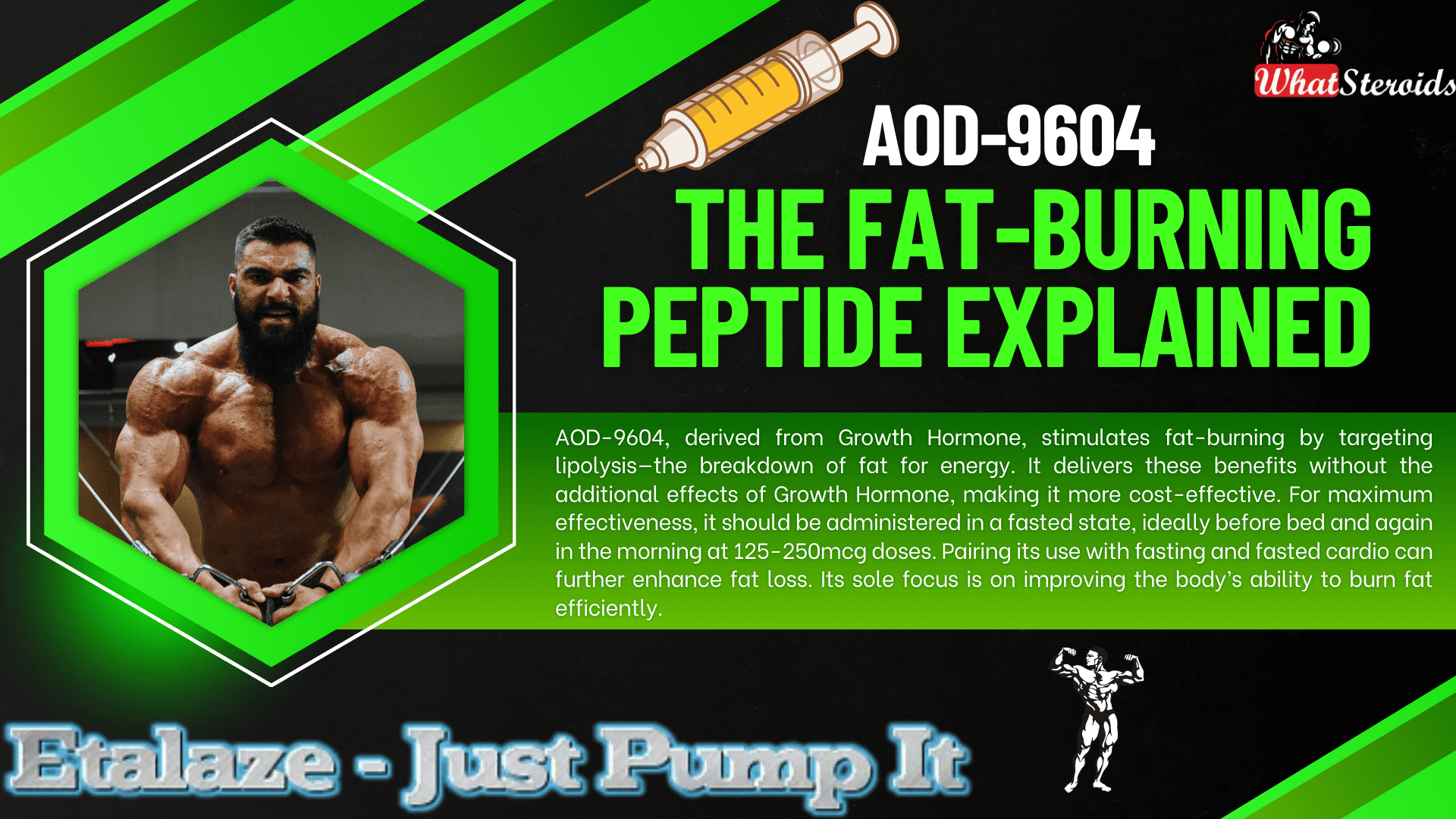
AOD-9604, along with the similar HGH Frag 176-191, is a peptide derived from Growth Hormone that includes only the amino acids in HGH responsible for stimulating fat breakdown, known as lipolysis.
This means that these peptides offer the fat-burning benefits of HGH without its other effects—whether beneficial or adverse—and come at a lower cost.
Related Article: Anavar Cycle for Men and Women
Lipolysis refers to the process where fat cells are broken down to be utilized as energy. AOD-9604 promotes accelerated fat loss by increasing the body's use of fat as fuel.
For optimal results, the peptides should be used in a fasted state. AOD-9604 and Frag 176-191 are most effective when administered at a dose of 125-250mcg before bedtime (at least 3-4 hours after eating) and in the morning at the same dose, followed by a fasting period of 3-4 hours, ideally combined with fasted cardio.
Check Out Dragontropin HGH 100 IU by Dragon Pharma
Similar Peptides with Fat-Burning Effect
Here’s a list of 10 peptides similar to AOD-9604, each with a brief description:
Ipamorelin: A growth hormone-releasing peptide (GHRP) that stimulates the natural release of growth hormone, promoting fat loss, muscle growth, and improved recovery without affecting other hormones like cortisol or prolactin.
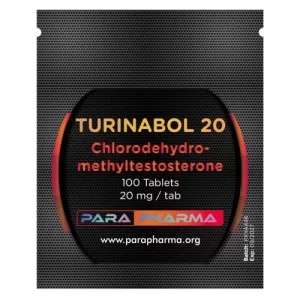 Click Here to Buy: Turinabol 20 by Para Pharma
Click Here to Buy: Turinabol 20 by Para Pharma
CJC-1295: A peptide that increases growth hormone and IGF-1 levels, aiding in fat loss, muscle gain, and improved sleep quality. It has a long half-life, making it convenient for users.
HGH Frag 176-191: A fragment of human growth hormone specifically designed for fat-burning. It targets adipose tissue without the broader effects of full-length HGH.
Tesamorelin: Known for reducing visceral fat, this peptide stimulates the release of growth hormone and is often used for weight management and metabolic health.
BPC-157: While primarily known for healing and recovery, BPC-157 can support fat loss indirectly by improving gut health and reducing inflammation.
Melanotan II: Originally developed for skin tanning, it also has appetite-suppressing properties, making it useful for weight management.
Thymosin Beta-4 (TB-500): Focused on healing and recovery, it can enhance physical performance and indirectly support fat loss through improved activity levels.
GHRP-6: A growth hormone-releasing peptide that boosts appetite and metabolism, aiding in muscle growth and fat loss.
Semaglutide: A GLP-1 receptor agonist that regulates appetite and blood sugar levels, making it effective for weight loss and metabolic health.
MK-677 (Ibutamoren): A growth hormone secretagogue that increases growth hormone and IGF-1 levels, promoting fat loss, muscle gain, and improved recovery.
List of Peptides With a Counteractive Effect Bodybuilders Must Avoid
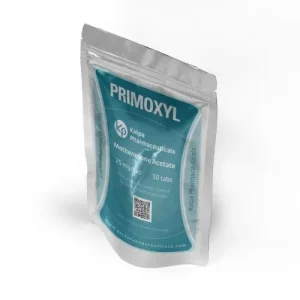 Click Here to Buy Primoxyl 25 by Kalpa Pharmaceuticals
Click Here to Buy Primoxyl 25 by Kalpa Pharmaceuticals
Some peptides can inadvertently lead to fat gain due to their effects on metabolism and appetite regulation. Here are a few that bodybuilders might want to avoid or use cautiously:
- GHRP-6 – While it stimulates growth hormone release, it also significantly increases appetite, which can lead to excess calorie consumption and fat gain.
- IGF-1 LR3 – This peptide enhances muscle growth but can also promote fat storage if not carefully managed with diet and training.
- MK-677 (Ibutamoren) – Though technically a growth hormone secretagogue rather than a peptide, it boosts GH levels but often leads to increased hunger and potential fat accumulation.
- CJC-1295 with DAC – While effective for muscle growth, its prolonged GH release can sometimes lead to unwanted fat retention if not paired with a strict diet
Overall
AOD-9604, derived from Growth Hormone, stimulates fat-burning by targeting lipolysis—the breakdown of fat for energy. It delivers these benefits without the additional effects of Growth Hormone, making it more cost-effective. For maximum effectiveness, it should be administered in a fasted state, ideally before bed and again in the morning at 125-250mcg doses. Pairing its use with fasting and fasted cardio can further enhance fat loss. Its sole focus is on improving the body’s ability to burn fat efficiently.
Read More: How Much Do You Know About B-AET? A Fat Burner You’ve Been Missing
Bodybuilding
Understanding Trenbolone-Induced Cough (“Tren Cough”)
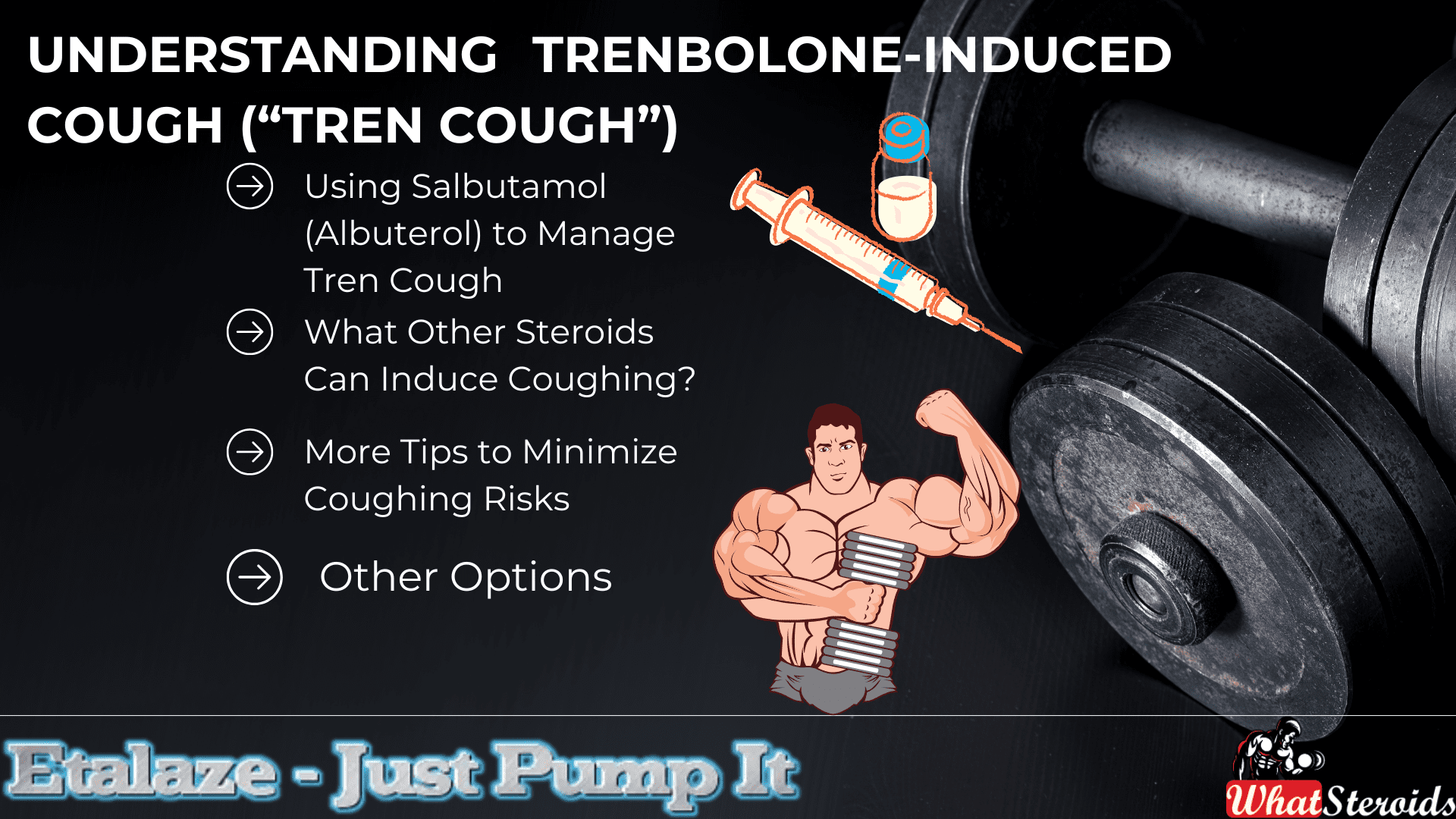
Trenbolone, a potent anabolic steroid, can sometimes cause “tren cough”—a sudden and intense coughing episode shortly after injection. Although not exclusive to Trenbolone, it is more commonly associated with this substance due to its highly irritant nature.
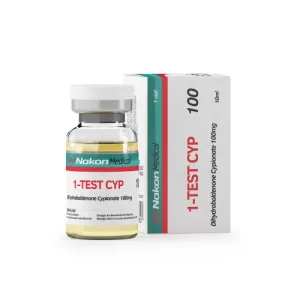 Click Here To Buy 1-Test Cyp 100 by Nakon Medical
Click Here To Buy 1-Test Cyp 100 by Nakon Medical
Mechanisms Behind Tren Cough
Solvent and Carrier Irritation
Trenbolone formulations often include volatile solvents like benzyl alcohol or benzyl benzoate, which may irritate lung tissues when absorbed quickly into systemic circulation.
Prostaglandin Release
Trenbolone promotes increased production of prostaglandins, particularly PGF2α. This compound triggers contraction in the smooth muscles of the lungs, leading to bronchoconstriction and coughing.
Micro-Oil Embolism
Tiny oil droplets from an injection can reach capillaries and travel to the lungs, causing mild embolic reactions that lead to temporary oxygen deprivation and coughing.
Histamine and Mast Cell Activation
For some individuals, Trenbolone triggers histamine release and mast cell activation, mimicking an allergic response and causing bronchospasms and cough reflexes.
Related Article: Best Syringes for Steroid Injection on Amazon
Using Salbutamol (Albuterol) to Manage Tren Cough
- Salbutamol, a widely-used β2-adrenergic receptor agonist, can alleviate tren cough symptoms by:
- Relaxing bronchial muscles, easing spasms that cause coughing.
- Inhibiting prostaglandin effects, reducing bronchoconstriction associated with PGF2α.
- Opening airways, preventing severe respiratory restrictions in susceptible individuals.
Application Methods
Inhaler (Optimal)
Take 1–2 puffs of salbutamol (100–200 mcg) 5–10 minutes before a Trenbolone injection. If coughing occurs afterward, additional puffs can swiftly resolve the issue.
Oral Tablets (Moderate)
Consuming 2–4 mg tablets 30–60 minutes before injection offers slower, longer-lasting relief but may be less effective than inhalation methods.
Nebulizer (Severe Cases)
For individuals with frequent episodes, nebulized doses of 2.5 mg salbutamol can provide substantial relief.
Preventive Measures to Reduce Tren Cough Risk
- Inject slowly to minimize systemic absorption and irritant effects.
- Split doses to lower reaction severity with smaller quantities.
- Opt for ventrogluteal injection sites, which have fewer blood vessels, reducing oil embolism risk.
- Choose lower-concentration solutions to lessen irritation, as higher concentrations (e.g., Tren Ace 200 mg/ml) are more likely to provoke reactions.
What Other Steroids Can Induce Coughing?
Here's a curated list of peptides, SARMs, and PEDs that may potentially cause coughing or respiratory irritation in bodybuilders and fitness enthusiasts:
Peptides
IGF-1 LR3 (Insulin-like Growth Factor): Known for its anabolic effects, IGF-1 LR3 can occasionally cause mild respiratory irritation due to systemic absorption.
TB-500 (Thymosin Beta-4): While rare, improper injection techniques or high doses may lead to transient coughing episodes.
GHRP-6 (Growth Hormone-Releasing Peptide): This peptide can stimulate histamine release, potentially leading to bronchospasms and coughing.
SARMs (Selective Androgen Receptor Modulators)
RAD-140: (Testolone) Some users report throat irritation or coughing, often attributed to solvents used in liquid formulations.
YK-11: Known for its myostatin-inhibiting properties, YK-11 may cause mild respiratory discomfort in sensitive individuals.
LGD-4033 (Ligandrol): Though uncommon, some users experience coughing due to carrier solvents or allergic-like reactions.
PEDs (Performance-Enhancing Drugs)
Boldenone Undecylenate (Equipoise): This injectable steroid can cause “Equipoise cough,” similar to tren cough, due to oil embolism or irritant solvents.
Testosterone Suspension: The water-based formulation may lead to coughing episodes if injected improperly or absorbed rapidly.
Nandrolone Decanoate (Deca-Durabolin): While less common, coughing can occur due to histamine release or systemic irritation.
More Tips to Minimize Coughing Risks
- Use proper injection techniques to avoid embolic reactions.
- Opt for lower-concentration solutions to reduce irritant effects.
- Consider antihistamines or bronchodilators for individuals prone to respiratory sensitivity.
Read More: Joint Stiffness: How to Manage It While on AAS
Are There Alternatives to Cough-inducing Steroids?
Here are some alternatives to cough-inducing steroids that can provide similar anabolic effects while minimizing respiratory irritation:
Peptides
IGF-1 LR3 (Insulin-like Growth Factor)
Promotes muscle growth and recovery without the irritant properties of certain steroids.
TB-500 (Thymosin Beta-4)
Enhances tissue repair and reduces inflammation, making it a safer option for recovery.
BPC-157 (Body Protection Compound)
Known for its healing properties, it supports muscle repair and joint health.
SARMs (Selective Androgen Receptor Modulators)
RAD-140 (Testolone)
Provides significant muscle-building effects with fewer systemic side effects compared to traditional steroids.
LGD-4033 (Ligandrol)
Boosts lean muscle mass and strength without the risk of respiratory irritation.
MK-677 (Ibutamoren)
Stimulates growth hormone release, aiding in muscle growth and recovery.
Natural Alternatives
Turkesterone
A plant-based ecdysteroid that supports muscle protein synthesis and recovery.
Ecdysterone
Another natural compound that mimics anabolic effects without the harsh side effects.
Creatine Monohydrate
Enhances strength and muscle mass through improved energy production during workouts.
Other Options
Human Growth Hormone (HGH)
Promotes muscle growth and fat loss, though it requires careful monitoring due to potential side effects.
Testosterone Boosters
Natural supplements like D-Aspartic Acid or Tribulus Terrestris can help optimize testosterone levels for muscle growth.
SARMs Alternatives
Legal and safer versions of SARMs are available, offering similar benefits without the risks associated with traditional SARMs.
Overall
We have explored the phenomenon of "tren cough," a sudden, intense coughing episode often caused by Trenbolone injections due to factors like solvent irritation, prostaglandin release, micro-oil embolism, or histamine activation. Preventive measures such as using salbutamol (via inhaler, oral tablets, or nebulizer), injecting slowly, splitting doses, and opting for lower-concentration solutions were highlighted.
Additionally, alternative compounds to tren cough-inducing steroids were discussed, including peptides like IGF-1 LR3 and TB-500, SARMs such as RAD-140 and LGD-4033, and natural options like Turkesterone, ecdysterone, and creatine. These alternatives provide anabolic effects while minimizing respiratory side effects. The conversation also underscored the importance of proper injection techniques and thoughtful compound selection to reduce risks.
Steroids
Creatine vs Myostatin: An Expert’s Analysis
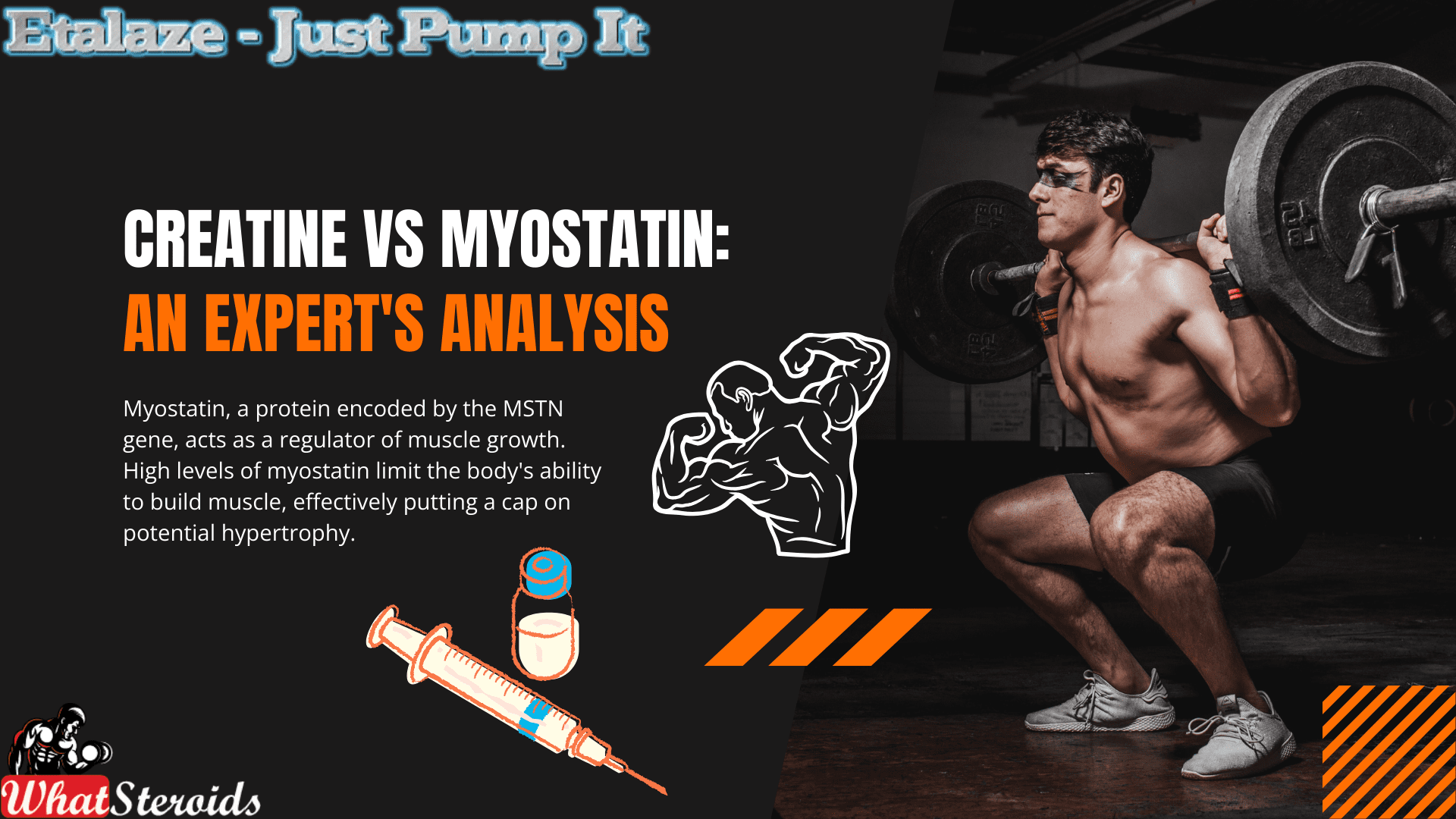
Myostatin, a protein encoded by the MSTN gene, acts as a regulator of muscle growth. High levels of myostatin limit the body's ability to build muscle, effectively putting a cap on potential hypertrophy. Inhibiting myostatin has become a focal point for bodybuilders looking to break through plateaus and achieve significant muscle gains. The question is: can creatine, a popular and widely available supplement, help in this regard?
Medical History of Myostatin and Creatine
Myostatin and creatine, while popular now in the bodybuilding world, have their roots in entirely different contexts:
Myostatin: Natural Muscle Growth Regulator
Myostatin is a protein originally identified for its role in regulating skeletal muscle mass. In nature, it serves an evolutionary purpose: by limiting muscle growth, it conserves energy, ensuring that animals (and humans) don’t expend unnecessary resources maintaining excessive muscle tissue. This was especially important in the wild, where energy efficiency could mean the difference between survival and extinction.
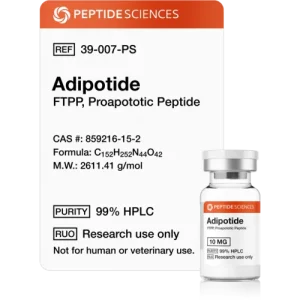 Check Adipotide (FTPP) 10mg by Peptide Science
Check Adipotide (FTPP) 10mg by Peptide Science
In the medical field, research into myostatin has focused on its role in muscle-wasting diseases. Scientists are exploring ways to inhibit myostatin to treat conditions like muscular dystrophy, where excessive muscle loss impairs quality of life. This therapeutic potential is where the idea of myostatin inhibition first began—long before bodybuilders latched onto the concept.
Creatine: Energy and Medical Applications
Creatine was originally studied for its role in energy metabolism. It’s a naturally occurring compound stored in muscle cells and plays a critical part in replenishing ATP (adenosine triphosphate), the body’s primary energy currency during short, high-intensity activities.
Before becoming a bodybuilding staple, creatine gained recognition in medical and sports science for its ability to improve athletic performance and assist with recovery. Furthermore, in medicine, creatine was investigated for neurological conditions such as Parkinson’s disease, Huntington’s disease, and muscular dystrophy, given its potential to improve muscle function and brain energy metabolism.
In the sports world, it was initially adopted by sprinters and weightlifters in the 1970s and 1980s for its energy-enhancing benefits.
Both myostatin and creatine have found new life in bodybuilding circles, demonstrating how discoveries in natural physiology and medical science can lead to transformative applications in fitness.
Benefits of Creatine as a Myostatin Inhibitor
Muscle Growth Potential: Research suggests that creatine, when paired with intense resistance training, may inhibit myostatin to a degree, fostering an environment for enhanced muscle growth.
Improved Exercise Performance: Creatine is well-known for its ability to increase ATP production, translating to better performance during high-intensity activities.
Versatility Across Fitness Levels
Whether you're a beginner or an advanced athlete, creatine offers benefits that complement various stages of muscle-building.
Must Read: A New Caffeine? What You Need to Know about Teacrine
Affordability and Accessibility
Compared to specialized myostatin inhibitors like YK-11 and ACE-031, creatine is significantly more affordable and accessible.
Side Effects of Creatine
While generally safe for most individuals, creatine supplementation does come with some potential side effects:
Water Retention: Some users experience bloating due to increased water retention in muscle cells.
Gastrointestinal Issues: High doses may lead to stomach upset or diarrhea.
Kidney Concerns: Although rare, prolonged excessive use could strain the kidneys, particularly in individuals with pre-existing conditions.
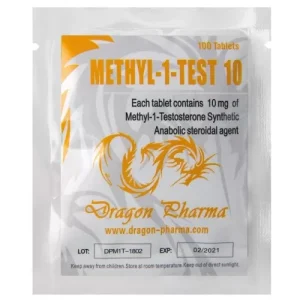 Buy Methyl-1-Test 10 -100 tabs by Dragon Pharma
Buy Methyl-1-Test 10 -100 tabs by Dragon Pharma
Alternatives to Creatine for Myostatin Inhibition
YK-11: A synthetic myostatin inhibitor derived from SARMs, offering more potent results but accompanied by more significant risks.
ACE-031: A peptide that directly inhibits myostatin, though it remains in experimental phases and is not legally approved in many regions.
Natural Alternatives
Follistatin-rich Foods: Eggs and dairy products may have natural myostatin-inhibiting properties.
Resistance Training: Intense and consistent weightlifting alone can naturally lower myostatin levels.
Where to Buy Creatine
Creatine is readily available worldwide. It can be purchased from:
Local Pharmacies and Nutrition Stores: Ideal for trusted and immediate access.
Online Platforms: Websites like Amazon, iHerb, or bodybuilding-specific stores offer a variety of brands and formulations.
Supplement Brands: Well-established brands such as Optimum Nutrition, MyProtein, and Cellucor often carry high-quality creatine.
Legality of Myostatin Inhibitors
Creatine: Creatine is completely legal and widely accepted as a dietary supplement.
YK-11 and ACE-031: These compounds exist in a legal gray area in many countries due to their experimental nature and potential risks. It's essential to research local laws before considering these options.
Best Stores and Suppliers
For reputable products, consider:
Transparent Labs: Known for purity and transparent labeling.
Optimum Nutrition: Offers pharmaceutical-grade creatine monohydrate.
Bulk Supplements: A great choice for bulk buyers seeking affordability and quality.
Our Advice to Bodybuilders
Always consult with a healthcare professional before starting any new supplement, especially if you are already using AAS or other advanced compounds.
Prioritize a balanced diet and consistent exercise routine. Supplements like creatine work best as part of a holistic approach to fitness.
Stay hydrated while using creatine to minimize water retention side effects and support kidney health.
Related Article: Best Syringes for Steroid Injection on Amazon
Overall
While creatine may not be as potent a myostatin inhibitor as advanced compounds like YK-11 or ACE-031, its affordability, safety, and accessibility make it a valuable addition to any bodybuilder's supplement stack. By leveraging its benefits alongside proper training and nutrition, you can maximize muscle growth and overcome plateaus, regardless of your fitness level.
-

 Steroids2 years ago
Steroids2 years agoShavers and Other Body Grooming Equipment for Bodybuilders In 2023
-

 Steroids2 years ago
Steroids2 years agoChatGPT and Other Avenues to Find Great Bodybuilding Coaches
-

 Steroids2 years ago
Steroids2 years agoBest Oil Recommendations Before Competition for Subtle Shimmer
-

 Steroids2 years ago
Steroids2 years agoPowerlifting Vs Power Building: Find Out the Big Difference and When to Shift Between the Two
-

 Bodybuilding Products1 year ago
Bodybuilding Products1 year agoTelmisartan In Bodybuilding: An Expert’s Advice
-

 Nutrition2 years ago
Nutrition2 years agoEverything Nutritional Food: What’s Too Much Or Too Little
-

 Bodybuilding9 months ago
Bodybuilding9 months agoPrimal Movements: Our Ultimate Guide for Maximum Results
-

 Anabolic Steroids10 months ago
Anabolic Steroids10 months agoJoint Stiffness: How to Manage It While on AAS
-
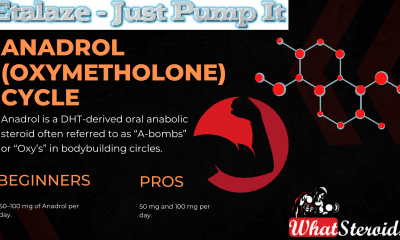
 Steroids1 year ago
Steroids1 year agoAnadrol Cycle: Benefits, Doses, Alternatives, etc.
-

 Bodybuilding1 year ago
Bodybuilding1 year agoChia Seeds in A Bodybuilder’s Diet: An Expert’s Advice
-

 Anabolic Steroids1 year ago
Anabolic Steroids1 year agoLegality of Anabolic Steroids In Latin America
-

 Beginners2 years ago
Beginners2 years agoTren Cycle for Beginners
-
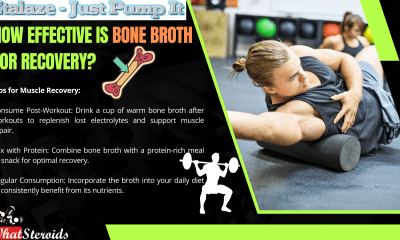
 Bodybuilding9 months ago
Bodybuilding9 months agoHow Effective is Bone Broth for Recovery?
-
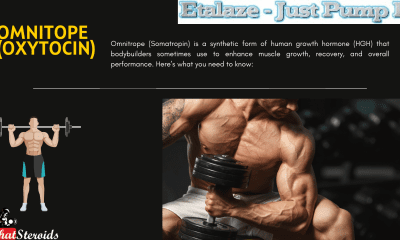
 Steroids11 months ago
Steroids11 months agoOmnitope (Oxytocin)
-

 Bodybuilding1 year ago
Bodybuilding1 year agoHow Much Is Too Much Cardio? Understanding Heart Rate Zones
-

 Steroids9 months ago
Steroids9 months agoSleeping Positions for Effective Muscle Recovery
-
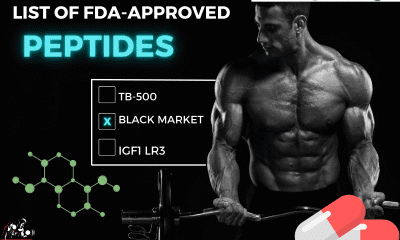
 Bodybuilding1 year ago
Bodybuilding1 year agoList of FDA-Approved Peptides
-

 Bodybuilding1 year ago
Bodybuilding1 year agoCalorie Dumping: A Bodybuilder’s Guide
-
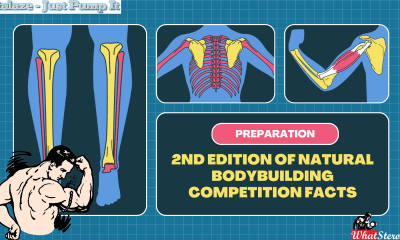
 Bodybuilding8 months ago
Bodybuilding8 months ago2nd Edition of Natural Bodybuilding Competition Facts
-

 Bodybuilding2 years ago
Bodybuilding2 years agoCompetition Prep Cycle for Pro Bodybuilders
-
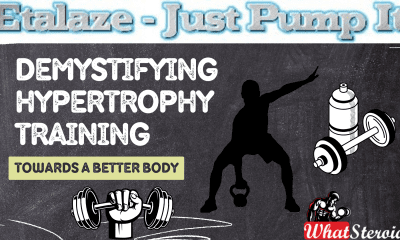
 Bodybuilding1 year ago
Bodybuilding1 year agoDemystifying Hypertrophy Training
-
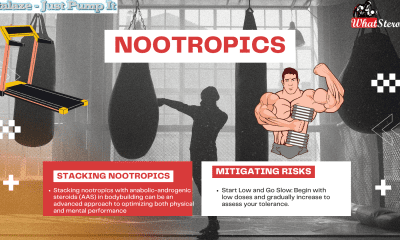
 Bodybuilding9 months ago
Bodybuilding9 months agoAre Nootropics a Better Option to AAS?
-
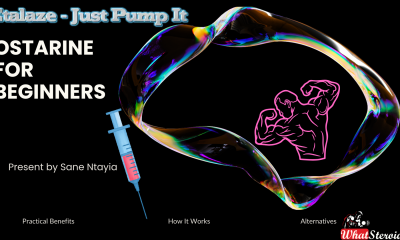
 Steroids5 months ago
Steroids5 months agoOstarine For Beginners: The Ultimate Guide
-

 Anabolic Steroids12 months ago
Anabolic Steroids12 months agoHow Much Do You Know About B-AET? A Fat Burner You’ve Been Missing
-

 Product Reviews12 months ago
Product Reviews12 months agoTop Vitamins for Skin Health

